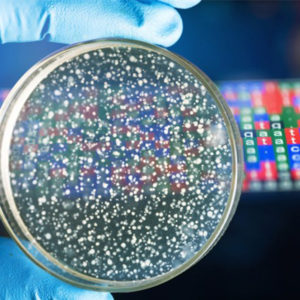Bacterial Genomes: Accessing and Analysing Microbial Genome Data
11 May–13 September 2020
Online, FutureLearn platform
Use computational tools to investigate microbial genomes
Overview
- Duration: 3 weeks, 5 hours per week
- Start Date: The course is run ‘live’ for 3 weeks from the start date above. Once this period is over there will be no live monitoring of the forums, but you can still join and complete the course during the remaining period.
- Free
- Certificate of achievement available on satisfactory completion
- CPD Approval: Royal College of Pathologists (15 CPD Credits)
Applying increasingly powerful computation to genomics contributes to important medical breakthroughs.
On this course, you will discover the basic principles of microbial bioinformatics analysis, and comparative genomics. Using Artemis, a free genome browser, you will find out how to investigate whole bacterial genomes, and through the analysis of bacterial genes and proteins, you will explore the genomic features of pathogens.
By the end of this course, you will be able to use genomic data to increase your knowledge of microbial genomes.
What will you achieve?
By the end of the course, you’ll be able to…
- Collect, access, and download whole bacterial genomes from public repositories
- Investigate and navigate bacterial genomes and their annotation using Artemis
- Identify genomic regions with low/high GC (guanine-cytosine) content, often associated with virulence
- Perform simple comparative analyses between bacterial genomes
Who is the course for?
This course would benefit those interested in learning how to use tools to investigate bacterial genomes, and acquire bioinformatics skills to evaluate the role of microbial genes in disease. Using analytical tools to access and probe genomes, learners will find out how to perform comparative analyses of genes and their protein products.
The course will be of interest to undergraduates, post-graduates, researchers, bioinformaticians, microbiologists, and healthcare professionals. The opportunity to use online computational tools to probe bacterial genomes will also be of interest to teachers and their 16-18-year-old science and computing students.
Bacterial Genomes: From DNA to Protein Function using Bioinformatics is a recommended pre-requisite. Scientific terminology is explained.
What do people say about this course?
“I really enjoyed the interviews – in particular the Artemis interview with Professor Julian Parkhill.”
Dr. Ulrike Böhme, Plasmodium Curator, Wellcome Sanger Institute, Wellcome Genome Campus, Cambridge, UK
“A highlight of the course is the project – it applies the newly acquired skill set.”
Mqondisi Tshabalala, PhD student, Institute for Cellular and Molecular Medicine, University of Pretoria, South Africa
Programme
Course start dates
This course is repeated twice a year.
Next start dates:
- 4 February 2019
What topics will you cover?
Week 1
- Multi-FASTA files
- Reference and draft bacterial genomes
- Introduction to Artemis, an open source genome browser
Week 2
- Genome annotation
- Genomic regions defined by GC (guanine-cytosine) content
- Accessing and downloading whole genome sequences
- Pathogenicity islands
Week 3
- Peer-reviewed project: Ecological niche adaptation between two Mycobacterium species
- Pseudogenes in Mycobacterium species
Educators
Lead Educators
Dr Anna Protasio
I am a researcher in parasitology and life sciences. I am passionate about bioinformatics and how we can use these tools to answer questions in biology.
Dr Christine Boinett
I am a researcher in bacterial genetics and my interest is in understanding the development of resistance in bacterial pathogens using next generation sequencing techniques.
Dr. Pablo Tsukayama
I am a professor of microbiology at Universidad Peruana Cayetano Heredia and a visiting research scholar at the Wellcome Sanger Institute. I study how pathogen populations evolve and spread in Peru.
Martin Aslett
I am the IT Manager for the Wellcome Genome Campus Advanced Courses and Scientific Conferences team. My interests lie in bioinformatics and its application to microbial genomics.
Matthew Dorman
I am a graduate student at the Wellcome Sanger Institute, where I research the virulence and the molecular genetics of bacterial pathogens as part of the Infection Genomics programme.
Programme Lead Educator
Professor Nicholas Thomson
I am a Group Leader at the Wellcome Sanger Institute. I provide scientific oversight for this course. I am interested in bacterial evolution and the spread of infectious disease.
What's included
Wellcome Genome Campus Advanced Courses and Scientific Conferences are offering everyone who joins this course a free digital upgrade, so that you can experience the full benefits of studying online for free. This means that you get:
- Unlimited access to this course
- Includes any articles, videos, peer reviews and quizzes
- Tests to validate your learning
- A PDF Certificate of Achievement to prove your success when you’re eligible

